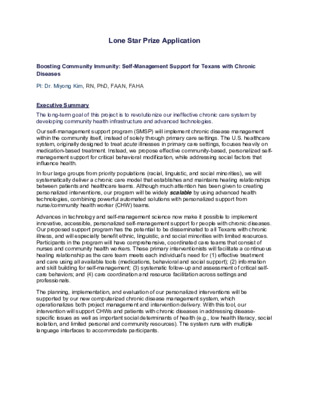Agenda Item 3b_LoneStar Prize Application — original pdf
Backup

Lone Star Prize Application Boosting Community Immunity: Self-Management Support for Texans with Chronic Diseases PI: Dr. Miyong Kim, RN, PhD, FAAN, FAHA Executive Summary The long-term goal of this project is to revolutionize our ineffective chronic care system by developing community health infrastructure and advanced technologies. Our self-management support program (SMSP) will implement chronic disease management within the community itself, instead of solely through primary care settings. The U.S. healthcare system, originally designed to treat acute illnesses in primary care settings, focuses heavily on medication-based treatment. Instead, we propose effective community-based, personalized self- management support for critical behavioral modification, while addressing social factors that influence health. In four large groups from priority populations (racial, linguistic, and social minorities), we will systematically deliver a chronic care model that establishes and maintains healing relationships between patients and healthcare teams. Although much attention has been given to creating personalized interventions, our program will be widely scalable by using advanced health technologies, combining powerful automated solutions with personalized support from nurse/community health worker (CHW) teams. Advances in technology and self-management science now make it possible to implement innovative, accessible, personalized self-management support for people with chronic diseases. Our proposed support program has the potential to be disseminated to all Texans with chronic illness, and will especially benefit ethnic, linguistic, and social minorities with limited resources. Participants in the program will have comprehensive, coordinated care teams that consist of nurses and community health workers. These primary interventionists will facilitate a continuous healing relationship as the care team meets each individual’s need for (1) effective treatment and care using all available tools (medications, behavioral and social support); (2) information and skill building for self-management; (3) systematic follow-up and assessment of critical self- care behaviors; and (4) care coordination and resource facilitation across settings and professionals. The planning, implementation, and evaluation of our personalized interventions will be supported by our new computerized chronic disease management system, which operationalizes both project management and intervention delivery. With this tool, our intervention will support CHWs and patients with chronic diseases in addressing disease- specific issues as well as important social determinants of health (e.g., low health literacy, social isolation, and limited personal and community resources). The system runs with multiple language interfaces to accommodate participants.